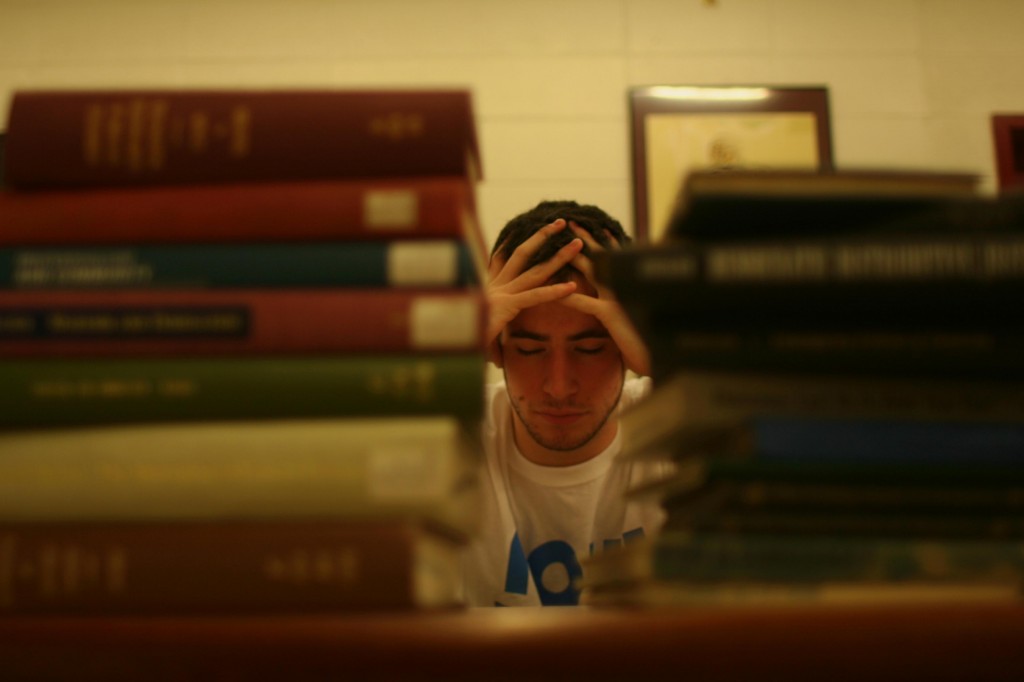Studies Find Clinical Depression on the Rise Among College Students
July 12, 2011

Published: February 2, 2011
More than half of students surveyed at Fordham College at Lincoln Center (FCLC) said their mental health affects them academically at least weekly, according to Counseling and Psychological Services (CPS), making them typical of students nationwide who, according to a national survey, suffer more frequently from mental illness than students in previous years.
Yael Nitkin-Kaner, staff psychologist and outreach coordinator of CPS, said, “On a recent survey of over 1,000 Fordham students, 56 percent said that a mental health issue impacted their academic performance frequently, at a rate of once a week or more.”
The American Psychological Association (APA) website states that depression is “more than just stress. People with depression may experience a lack of interest and pleasure in daily activities, significant weight loss or gain, insomnia or excessive sleeping, lack of energy, inability to concentrate, feelings of worthlessness or excessive guilt and recurrent thoughts of death or suicide.”
From studying the number of students on psychotropic medicines, the APA’s findings reveal that cases of depression and anxiety have increased over 10 percent in the past 10 years.
One student suffering from the illness had his own explanation of depression. “It’s just this feeling of not being able to cope with daily life,” said the student, who requested to remain anonymous. “It’s a demoralizing feeling where you can’t cope to perform a task, even if you have complete desire to do so.”
Six of the students interviewed at FCLC listed the competitive and demanding nature of college as factors that may aggravate mental illnesses. Others factors cited by students included stresses from living in McMahon, the financial burdens of tuition, extensive course requirements, and high expectations put on students by the administration and their parents. Lastly, the students said that anxieties over their futures could pose a serious problem for victims of depression.
The anonymous student interviewed said, “Fordham and New York can be a very difficult place to live. [Fordham] is a very small community, and New York City is a very big community.
“Both of them can be difficult to fit into, and that can really throw you off because you’re trying to fit into something very small and something large in the same place. And on the one hand, you feel like you can’t get help at school because it’s too small to feel safe and approachable and you can’t get help in the city because it’s too big and impersonal.”
Chun Siu, FCLC ’12, mentioned another possible aggravator for depression in students. “I’ve noticed that many of my classmates are stressing out over their internships and trying to find a job, especially in this market. Even though many of our professors are telling us [otherwise], we know better. It’s not as easy as before.”
Researchers of the APA described the growing trend of depression and anxiety among college students as a result of adolescents being more effectively treated for serious mental illnesses during their childhood, enabling them to go on to high school and even higher education. Yet students still carry their conditions of depression and anxiety with them throughout their college years.
CPS at FCLC gives students who may be suffering from mental or emotional distress the opportunity to seek guidance by offering 10 free counseling sessions.
Nitkin-Kaner said, “Students come to CPS with a wide range of concerns, none of which are too big or too small to bring to our attention. The most common are depression and anxiety, which can be rooted in other problems such as family concerns, medical illness, loss of a loved one, lack of social support or community, an experience of sexual assault or substance abuse problems.”
However, while some students noted that CPS has a friendly and helpful staff, others doubted whether or not CPS is equipped to handle this issue.
Miriam Sahler, FCLC ’11, said, “I feel as though sometimes 10 sessions isn’t going to cut it when people have really deep issues [because] there are people who go to a therapist for years.”
Jaimie Boyd, FCLC ’12, agreed and said, “If you have a serious mental problem, I would recommend professional [help] and paying for it.”
Despite the challenges and aspects of Fordham’s environment that may be conducive to depression, the students believe that FCLC’s various programs and small campus size can possibly help students overcome issues with depression and anxiety.
Boyd also noted that finding a supportive group of friends on campus can be hard, intensifying the problems students may have and increasing their chances of depression and anxiety.
She said, “Finding your niche is hard. It takes a lot of test trials. So while you’re in those test trials, you may be getting down on yourself, thinking, ‘Okay, will I ever find the people that [are] good for me?’ But usually, if you keep trying, you’ll find it.”








